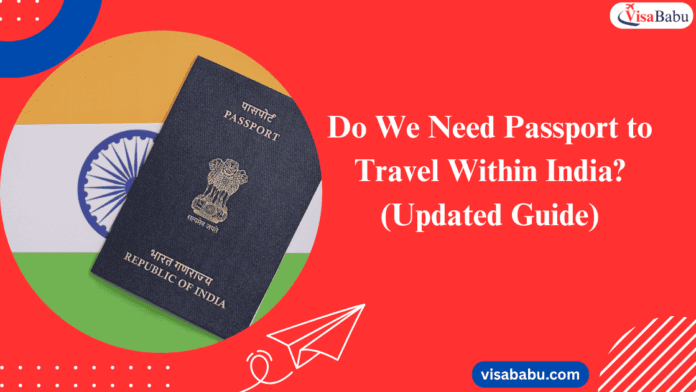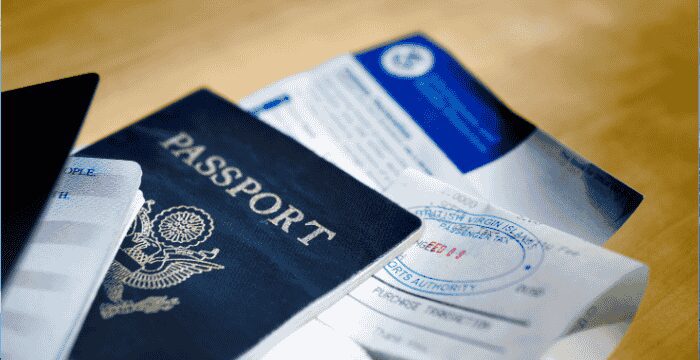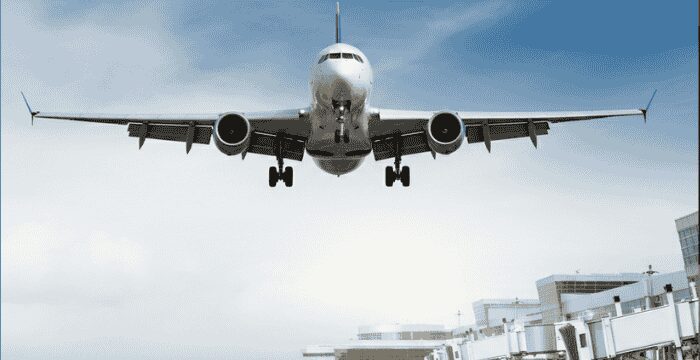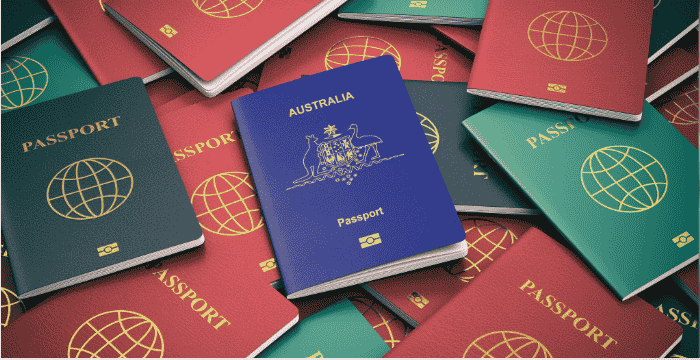The question, ” Do we need a passport to travel within India is one of the most frequently asked questions by travellers planning domestic trips. You do not need a passport to fly within India, even if you are an Indian citizen. This detailed guide explains what documents you need, which IDs are accepted and how to travel smoothly as a domestic traveller in 2025.
Now that India’s domestic airlines carried 14.5 million passengers in March 2025, up by 8.79% from the previous year, it is more necessary than before to learn about the proper documents needed when travelling. No matter if you have never travelled before or are a seasoned flyer, knowing what ID you need can make things less stressful at the airport.
What You Need to Know about the Domestic Air Travel ID in India in 2025?
- You need very little to identify yourself when flying in India, which makes travel open to all citizens. Thanks to guidelines from the BCAS, domestic flights in India do not require passengers to have a passport.
- Valid government photo IDs are all that Indian citizens need for domestic air travel. Thanks to this policy, many Indians without passports are able to use air travel inside the country. You only need to bring an ID that is original and shows both your photo and personal information.
- You must have an ID whose name is the same as that on your flight ticket. A mismatch between your ticket and ID may make it impossible for you to board the plane or lead to delays. All passengers, even children, are expected to be matched, but there are rules for minors and infants.
- Those controlling security at the airport can quickly check your documents to help you pass through with efficiency. Usually, the procedure only lasts a few seconds when your documentation is prepared and at hand.
What Identification Documents Are Used for Travel on Domestic Flights (2025)?
There is a list of identification documents, all issued by the government, that can be used for Indian domestic air travel. Passengers travelling by air in the US can use ten different kinds of identification documents which have been approved by the BCAS.
| Document Type | Issuing Authority | Digital Version Accepted | Age Requirement |
| Aadhaar Card | UIDAI | Yes (DigiLocker) | All ages |
| Voter ID Card | Election Commission | Yes (DigiLocker) | 18+ years |
| Driving License | Regional Transport Office | Yes (DigiLocker) | 18+ years |
| PAN Card | Income Tax Department | Yes (DigiLocker) | All ages |
| Passport | Passport Office | No digital version needed | All ages |
Common types of identification paperwork are:
Aadhaar Card – The best recognised form of identification is the Aadhaar Card, which is issued by UIDAI. Passengers can use physical cards or those from DigiLocker at all major airports.
Voter ID Card – The Election Commission of India issues Voter ID Cards, which are approved as both proof of identity and citizenship for travelling within India.
Driving License – Any driving license from a Regional Transport Office in India is sufficient for travelling by air within the country.
PAN Card – PAN cards are issued mainly for taxes, but you can use yours with a photo to board a flight within India.
Government Employee ID –Airline passengers can present their Government Employee IDs, issued by state, central or public bodies, at the airport.
Now, airports use DigiLocker for a fast and efficient way to check documents. Digital Aadhaar cards, driving licenses and PAN cards from your DigiLocker account can now be accepted by the Ministry of Civil Aviation. But documents that users upload themselves in the “Uploaded Documents” area are not accepted.
| Document Type | Specific Requirements | Notes |
| Student ID Card | Government or recognised institution | Must include a photograph |
| Nationalised Bank Passbook | With an attested photograph | Physical document only |
| Pension Card/Documents | With photograph | For senior citizens |
| Disability ID Card | State/UT government issued | Includes medical certificates |
| Armed Forces ID Card | Defense services | Active or retired personnel |
Do We Need Passport to Travel Within India by Air? (2025 Update)
Do we need a passport to travel within India by air remains a common concern, but the 2025 guidelines are crystal clear: Indian citizens do not require a passport for domestic air travel. The policy has stayed the same and ensures all citizens can use air travel no matter where they come from.
International travel requirements for a passport make many people assume a passport is required within their own country. Nonetheless, Indian rules on domestic aviation state that travellers in India do not need a passport.
Exploring inside India with just another form of ID is easy and even supported by local authorities. Thanks to this policy, Indians without passports can still use domestic air travel.
| Scenario | Passport Required | Alternative ID Accepted | Additional Notes |
| Indian citizen, domestic flight | No | Yes | Any government photo ID |
| Foreign national, domestic flight | Yes | No | Passport mandatory |
| Connecting an international flight | Yes | No | An international leg requires a passport |
| Emergency travel | No | Yes | An affidavit may be accepted |
Although you don’t have to have a passport, it is accepted all over the world as a form of identification. When visiting places they haven’t been before or when their main ID is damaged, many travellers bring their passports as a precaution.
The 2025 update reinforces that we do not need a passport to travel within India has a definitive answer: No, for Indian citizens. Being aware of airline rules and state rules makes your trips less stressful.
Latest Indian Travel Guidelines for Minors, Families, and Foreign Nationals in 2025
Going on Vacation with Children and Minors
There are special regulations for minors’ travel documents in India because they need different identification from adults travelling. The idea behind the regulations is to keep children safe while managing normal documentation.
Anyone travelling domestically between the ages of 2-12 must bring identification documents with them. The documents you can use are school ID cards, birth certificates, Aadhaar cards or passports. In most cases, having the ID of the accompanying adult is sufficient, but it’s always better to bring a child’s ID to prevent problems.
| Age Group | Required Documents | Additional Requirements | Notes |
| Infants (0-2 years) | Birth certificate | Medical certificate if under 7 days | No separate seat required |
| Children (2-12 years) | School ID, birth certificate, or Aadhaar | Parent/guardian ID if accompanied | Separate seat required |
| Unaccompanied minors (5-12) | Valid photo ID | UMNR form, parental consent | Special airline procedures |
Any children travelling alone should have forms, parental permission and information for the person meeting them at their destination. Airlines generally charge additional money for unaccompanied minors and take certain steps to keep children safe during their trip.
Latest Travel Rules for Foreigners Flying Within India in 2025
- Rules for Indian citizens on domestic flights are not the same as those for foreigners. The rule for all foreign visitors flying within India, even just to another city, is to have both their passport and a valid visa.
- This requirement is made because Indian authorities relate foreigners’ legal status to their passports and visas. Authorities may perform unexpected checks, and airlines must confirm that foreign passengers are allowed to board.
- Foreigners cannot use the same acceptable alternative identification documents as Indian citizens. Because it identifies them and shows their legal status, a passport is necessary for everyone’s travel in India.
Latest Indian Airline-Specific Documentation Requirements (2025)
Domestic airline policies in India may have small differences between airlines, yet all must follow the BCAS guidelines. Even though the main identification rules are the same, airlines have the ability to use stricter ways to confirm travellers’ identity.
While IndiGo, Air India and SpiceJet follow regular BCAS rules, budget airlines might implement extras to avoid passengers being late for their flights. Higher-class airlines often allow more freedom with document checks and offer improved assistance to passengers who are facing document problems.
| Airline Category | Standard ID Acceptance | Digital ID Support | Special Services |
| Full-service carriers | All BCAS-approved IDs | DigiLocker supported | Dedicated family counters |
| Low-cost carriers | Strict BCAS compliance | Limited digital support | Basic verification only |
| Regional airlines | Standard requirements | Varies by airport | Local language support |
At select airports, Air India’s ZipAhead allows economy passengers to check in and board faster by paying ₹499-699 for priority privileges. Such services are especially useful when you have a lot of documents to handle or travel during the busiest times.
If you travel with a group, as a business group or have special needs, airlines can have different policies for you. Before departure, make sure you understand your airline’s latest rules if you are flying with a minor or showing unique ID documents.
Latest Indian Airline Rules that are Different in Every State (2025)
India and regional regulations for travel can complicate your plans for domestic trips. Although all states must follow BCAS standards, some may add their own rules because of local conditions, health rules or security needs.
Some regions of the northeast and the border area may ask for extra permits or documentation along with your ID document. The restrictions on movement usually affect all visitors, including Indian citizens as well, to help maintain security in border regions.
| Special Circumstance | Additional Requirements | Applicable Regions | Validity Period |
| COVID-19 protocols | Vaccination certificates | Varies by state | As per state guidelines |
| Restricted area permits | Special permission letters | Northeast states, border areas | Specific duration |
| Health declarations | Medical certificates | During health emergencies | Temporary measures |
| Security clearances | Additional verification | High-security zones | Case-by-case basis |
During the pandemic, many governments made it necessary for domestic travellers to provide vaccine certificates or negative test documents. Most of the restrictions have been removed, though some states may put them back in place during health emergencies.
Before flying to such areas, it’s important for travellers to check the special rules for each state. Both state government websites and airline operator customer service departments can tell you if you’re expected to present documentation.
Benefits of Carrying a Passport When Travelling Within Your Country (2025)
While it’s not necessary, having your passport can make travelling within different states both easier and more secure.
One of the best reasons to have a passport is for backup identification. If your usual ID is gone or in doubt, a passport is accepted as identification wherever you are. This reduces the risk of travel changes and means you won’t need to deal with document issues at the airport.
Because their identification is recognised everywhere, passport owners never have to prove their documents are valid. People in charge at airports, security and airlines can quickly confirm the validity of passports.
| Advantage/Benefit | Applicable Scenarios | Cost Consideration |
| Backup identification | Lost/damaged primary ID | No additional cost |
| Prevents travel disruption | All airports nationwide | Initial passport fee |
| Universal acceptance | Domestic-international flights | Long-term investment |
| Faster verification | Seamless connections | Peace of mind value |
| International connectivity | Emergency travel | |
| Quick verification | Urgent travel situations | |
| KYC processes | Airport services, hotels | |
| Simplified verification | Convenience factor |
If you travel internationally with a connecting flight, your passport allows you to avoid having to bring multiple documents. Because fewer documents are needed, it’s less likely you’ll lose your essential documents while you travel.
When a family emergency happens and you need to travel fast, it is easier if you already have your passport ready. The document being recognised everywhere can help with speeding up emergency travel and solving problems with overly slow bureaucracy.
Common Travel Mistakes to Avoid and Expert Tips for Smooth Journeys (2025)
If you lose your identity documents or make typical travel errors, your journey can be seriously interrupted. Being aware of these risks and putting some measures in place helps you travel more smoothly within your country.
Discrepancies between a person’s name and what is on their documents are the largest problem faced by those travelling within the country. If a person’s ticket says full names and their ID documents contain initials or abbreviations, boarding can be prevented. Because South Indian travellers’ names often use initials instead of surnames, this issue is more common for them.
Things you should avoid doing:
- Purchasing tickets under a different name than what’s listed on your ID
- Using identification documents that are no longer fresh or that have been damaged
- Not reviewing the documents needed by the airline.
- Travelling without checking the rules for each state you are planning to visit
- Not having a backup of your ID or documents
- Forgetting to explore the possibilities of DigiLocker
- Insisting on document verification at the last moment for kids
| Mistake Category | Prevention Strategy | Solution if It Occurs | Time Impact |
| Name mismatch | Verify names before booking | Contact the airline for correction | 30-60 minutes |
| Expired ID | Check validity before travel | Carry backup identification | 15-30 minutes |
| Missing documents | Create a travel checklist | Airport affidavit process | 60-120 minutes |
| Digital ID issues | Test DigiLocker access | Use physical backup | 10-15 minutes |
Experts Latest Travel Tips for a Hassle-Free Airport Experience in 2025
- You should make sure all your digital copies are stored in the “Issued Documents” part of DigiLocker. Check how you can log in to your account from anywhere and pack copies of your documentation in case the app fails.
- Come to the airport early, especially if you are travelling with children, people who are elderly or those with less normal forms of ID. With additional time, you have more time to verify the documents.
- Be certain to both photocopy and store on your phone copies of all your necessary documents safely. Although they are considered secondary, they help in checking who someone really is.
- Choose online check-in when you can to skip some steps at the airport. This becomes useful when you’re with a group, since checking everyone’s paperwork may take some time.
- Check the rules of the airline you choose, particularly if you haven’t flown with them before or if your identification documents are not Aadhaar or a driving license.
Conclusion
Do we need a passport to travel within India? The answer is a clear and definitive answer: No, Indian citizens do not require a passport for domestic air travel. Having a valid photo ID from any government allows anyone to fly domestically, so flying is open to every citizen.
Since Aadhaar cards, voter IDs, driving licenses and PAN cards are accepted, almost every Indian person can use air transport inside the country. Now, using DigiLocker airport India support, people can verify their identification with digital documents.
People travelling domestically should make sure their ID and ticket names are consistent, understand the airline’s rules and know what individual state rules might be. Even though a passport is useful, Indians do not need one to travel within their own country.
Yet, foreign nationals need to bring their passport and a valid visa for all their domestic flights in India. This condition helps to satisfy immigration rules and keeps their paperwork related to their status secure.
As more people travel by air in India in 2025, knowing what documents are needed becomes more necessary. Relying on the tips in this guide helps people have carefree domestic journeys in India.
FAQs(Frequently Asked Questions)
Q1. Can I move around India without showing any identity documents?
Ans. A valid government-issued photo ID is needed by all passengers on domestic flights in India. Passengers are not allowed to board planes until their identification is checked by airlines and airport security.
Q2. Do you need a passport for flights within India?
Ans. You do not need a passport if you want to travel within India by air. You can use any photo ID from the government, such as Aadhaar, voter ID, driving license or PAN for domestic flights.
Q3. Can you use digital IDs for domestic boarding?
Ans. At most airports in India, travellers can use their DigiLocker-stored Aadhaar, driving or PAN cards by clicking on “Issued Documents.” A document uploaded by the user is not treated as official.
Q4. What should I do if I lose my ID before I start my journey?
Ans. You may have to use an affidavit or another verification, but using them will probably add a lot of extra time before you board. You should hold a copy of your ID with you or call the airline as soon as possible for advice about identifying yourself differently.
Q5. Should children get an ID to travel on domestic flights?
Ans. Minors are required to present their school ID cards, birth certificates, Aadhaar cards or guardian’s ID when entering the park. Extra documents, such as UMNR forms and parental consent, are needed for unaccompanied minors.
Q6. Are foreigners allowed to show their home country ID when flying within India?
Ans. Yes, anyone not from India must show their passport and a valid Indian visa for all flights inside the country. Residents are not allowed to use identification from their home countries.
Q7. Can you use expired documents for your domestic flight?
Ans. All identification documents should be valid and for use. If your ID is not valid, you may be refused entry onto the aeroplane.
Q8. Should I change my ticket if my name appears differently from my ID?
Ans. Get in touch with the airline right away to make sure your name is fixed. If there are only small differences, it’s OK, but big discrepancies could result in no boarding. There are airlines that levy fees for changing your name.









